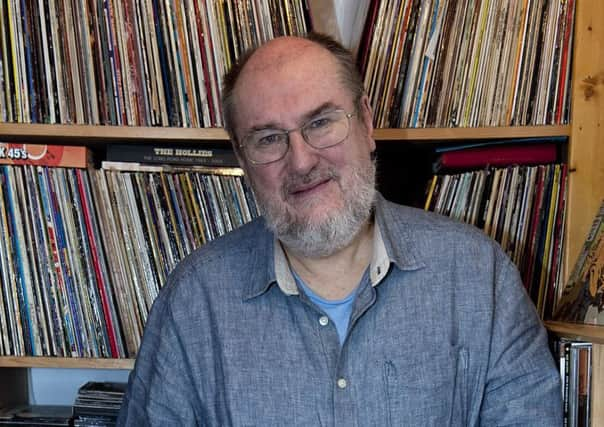Obituary: Stewart Cruickshank


Born: 3 August, 1951, in Edinburgh.
Died: 16 November, 2015, Glasgow, aged 64.
A radio producer for BBC for almost 35 years, Stewart Cruickshank was hugely influential in the way folk and other popular music, from Scotland and beyond, was broadcast. Never a man to be tied to one genre, he was the mastermind behind the scenes of such long-running Radio Scotland staples as Travelling Folk and Iain Anderson’s shows as well as the station’s rock programmes such as Beat Patrol, while also producing BBC2 radio series on such rock luminaries as Ray Davies, the Sex Pistols and the Who.
A hugely liked figure, Cruickshank also spent time in the United States interviewing Jackson Browne and Lou Reed for shows about them that would be networked globally. He was as much in his element producing an album by American rockers Mercury Rev as he was sitting on the boards of the Burnsong songwriting project. In 2000 he was awarded Fellowship of the Royal Society of the Arts for his contribution to UK music radio.
Advertisement
Hide AdAdvertisement
Hide AdEarlier this year, when he was being honoured by the Hands Up for Trad organisation for his contribution to radio, Cruickshank, an ebullient and infectiously enthusiastic champion of the music he put on the airwaves, told this writer: “I’ve been very lucky. I’ve been honoured to showcase tens of thousands of hours of dazzling musical talent on radio, from Scotland and from way, way beyond.”
He brought an interesting mix of credentials to his early broadcasting career, including serving time in a folk-rock band and an honours qualification in librarianship. His interest in music and radio, however, went back to his earliest days in Edinburgh, where, like so many of his generations, he would listen to his “trannie” under the bed covers at night, absorbing the Sixties sounds of Radio Luxembourg and Radio Caroline. A defining moment was catching John Peel’s short-lived but fondly remembered series The Perfumed Garden during the final weeks of the pirate station Radio London until it closed down in August 1967. The programme’s eclectic mix, which could range from Pink Floyd to Bert Jansch, left an indelible mark on the boy.
Leaving Trinity Academy in Edinburgh, he deferred going to university for seven years while he (under the pseudonym Gilmore Wines after a local off-licence) and his friend Wilf Smarties (who retains that alias to this day as a record producer and songwriter) became the core of Mowgli and the Donuts, based in East Anglia, where fame sadly eluded them. Cruickshank and Wilf were in the process of completing a new Mowgli project at the time of his death.
In 1980, armed with his love of music, on-the-road experience and honours degree in economics and – most pertinently – librarianship, Cruickshank turned up at BBC Scotland’s former Queen Margaret Drive headquarters in Glasgow for a trial week as a “gramophone librarian”. The week would extend to some 35 years.
He initially worked as a recorded music librarian while producing Radio Scotland’s Top 40 and researching for The Ken Bruce Show. The mid-Eighties saw him producing Beatstalking, a history of Scottish rock music presented by Muriel Gray, then founding and co-producing the long-running indie rock show Beat Patrol with Sandy Semeonoff and Peter Easton.
He became a contributing editor for John Purser’s ground-breaking series Scotland’s Music before he went on, with Rab Noakes and Donald MacInnes, to create Radio Scotland’s Be-Bop to Hip-Hop jazz programme, Original Masters with John Cavanagh, and pilot the series Celtic Connections, from which Glasgow’s mammoth festival would take its name. Further challenges included broadcasting T in the Park and the long-running Travelling Folk and Iain Anderson’s show.
Outside regular programming, he was senior producer for Music Live 2000 from Shetland and for the 2005 G8 Summit rally at Murrayfield. He also brought professional expertise to the boards of the Scottish Music Centre and the Burnsong scheme.
Stewart left BBC Scotland nine years ago but continued to co-produce the Iain Anderson programme, in association with the production company Bees Nees, until he finally retired last year.
Advertisement
Hide AdAdvertisement
Hide Ad“The landscape of Scottish Music would be entirely different were it not for him,” said his friend, fanzine publisher and blogger Lindsay Hutton. “He struck all manner of blows against the BBC empire to keep programming at BBC Radio Scotland at the forefront. He was responsible for successful show after show.”
Cruickshank, he adds, was a master in terms of people skills. “He even managed to charm Lou Reed,” he continues, referring Cruickshank’s New York interview with Lou Reed for Radio 2, when he returned with seven hours of material after a colleague, dispatched earlier to interview the famously taciturn singer-songwriter, had returned empty-handed. “No-one ever came away from an encounter with Stewart unaffected by his enthusiasm.”
Another friend, singer-songwriter Duncan McCrone, said: “Stewart was just an absolute life force; he was the most enthusiastic man, and he took an interest in everybody. In a restaurant he’d be asking waiters where they came from and what their favourite music was.”
Cruickshank is survived by his wife, Lorraine, whom he married in 1989.
JIM GILCHRIST